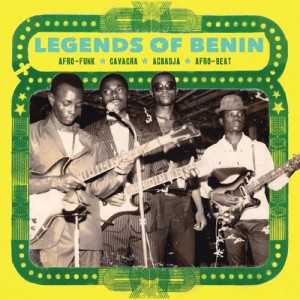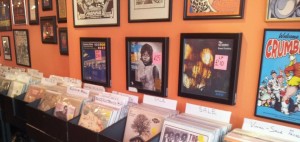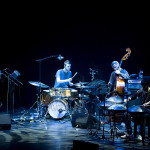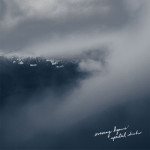
As part of our Record Store Day deliberations and celebrations we’ve asked our writers and contributors to offer up praise, homage and anecdotes about their favourite local record oasis. Living only a reasonable train journey ride away from Brighton, I’ve lucked out in the past, with a respectable selection and diverse range of vinyl emporiums to chose from: rightly so in one of the UK’s most culturally rich cities. However even Brighton has suffered in the Internet epoch, losing the much loved and respected Rounder Records only last year, and maybe losing another institution (on the high Street at least) Borderline Records.
Though still a healthy climate, as opposed to much of the desolate record store free country, Brighton is holding on in there with Resident and a scattering of specialists and second-hand stores.
Borderline Records in the North Laines, has a sweet spot on the main thoroughfare. A mecca for reissue stock from every conceivable genre, alongside the latest releases, make this an essential stop over on any pilgrimage to the city. I’ve personally been picking up obscure psych, garage losersville compilations, erotic horror soundtracks and Kosmiche transmissions for the past decade from the small, but perfectly formed, elongated record haven. Unfortunately the crippling costs of business rates and rent may force the business to shut down, switching wholly to an online format.
Here is a litte tribute in its’ honour, a review from back in 2010 of my most prized and special Afro Beat album, Legends Of Benin; brought purely on hearing it blasting out from the shop’s sound system. Thank you Borderline for turning me on to the sounds of west Africa, a relationship that has since seen me become quite the enthusiast, reviewing and offering opinion on the African music scene for the last three years. For that we salute you!


Afro beat; Afro funk and all its many bewildering sub genres have always slightly perplexed me. I’ve often taken a peek and thumb through the African music section in all the record shops that I regularly frequent, though until now I have left it well alone.
The sheer depth and number of styles have often left me confused, as a novice I feel a little shy to point out my ignorance, though it never usually stops me from having a punt and purchasing a record on chance alone. Well on this occasion my first ever-actual proper buy was aided by complete chance. I happened to be in Borderline Records store in Brighton, an emporium of reissues and forgotten gems from bygone ages. On that day they were playing some pretty groovy foot tapping sounds, a quaint version of early Stax mixed with liberal lashings of James Brown’s infused funky Zaire period soul. Instantly I became hooked as my whole body decided to break out into some embarrassing Paul Simon induced dance routine.

Cut a long story short I ended up asking the owner what he was playing, he kindly showed me what it was and I ended up with Legends Of Benin a lovingly compiled album of 14-tracks by four of the African country of Benin’s finest artists. In case your knowledge of African geography is shaky, Benin is in the west and borders Togo, Nigeria, Burkino Faso and Niger. Tightly caged in by its neighbours the influence of all these regions leaks into the music to create a unique mash up of rhythms and beats, that switches from rhumba to rocksteady in the blink of an eye.
The artists on this album include the likes of Gnonnas Pedro, a politically charged crusader; El Rego, an entrepreneur of dubious enterprises including a brothel and a boxing club; Antione Dougbe, a much feared ‘Vodun’ pries; and Honore Avolonto, responsible for the country’s biggest selling album of all time. These pioneers of poly-rhythmic charged music were all collected together by German based label Analog Africa’s Samy Ben Redjeb, an honourable sounding advocate of the genre who should be commended for his efforts.
His personal sleeve notes lavishly grace the record with a real fondness and warmth, though he had many problems licensing and obtaining permission to release this record. Three of the four artists are no longer with us so their legacy has been left in the hands of relatives and old musical comrades, not all of them initially eager or trusting in the beginning.
The music itself is a combination of funk, rhumba, soul and an attempt at reggae, all served with a thick dose of infectious grooving traditional African rhythms and instruments. Local bands to the region back each of the artists, from the military moniker Commandos, to the exotically named Black Santiago. Being a former colony of France the songs are titled and sung in the former interlopers language, if it makes sense these tracks even sound like they’re being played in French.
Highlights on this record include El Rego’s ‘Feeling You Out’, which has an inviting bass line that introduces a prime slice of James Brown at the Apollo rawness, whilst the sax sounding squeaks coupled with a break beat backing produce a Northern soul stomping missing classic. Antoine Dougbe, the high priest of some primal religion who professed to be the spirit of a dead relative sent back to this world so he could heal and curse those who cross him, concocts a swinging style of pulsating and joyful abandon on ‘Ya Mi Ton Gba’. His more down to earth day job as a musician is less frightening then the reputation that precedes him. Honore Avolonto on ‘Tin Lin Non’ delivers an Afro beat groove behemoth that just never lets up, whilst Gnonnas unleashes a call and response soul spine tinkler with ‘Okpo Videa Bassovo’. His other notable attraction is ‘Dadje Von O Von Non’ which opens with ghostly sounding twanging guitars and features catcalls over a bouncing melody.
Some of the tracks are more laid back and quite subtle, evoking comparisons in some ways to more primal Ska. There is a real sense of authenticity running through these tunes and they come across as quite fun to make. All the musicianship is tight with plenty of space to let it breath, there are no solos or hogging of the limelight to be found. As to all the different genres I’m still not too sure how they’re prescribed only that it has something to do with timing, the instrumentation and that some of the styles are derived from ceremonies and folklore. None of this matters of course as they all sound great.




